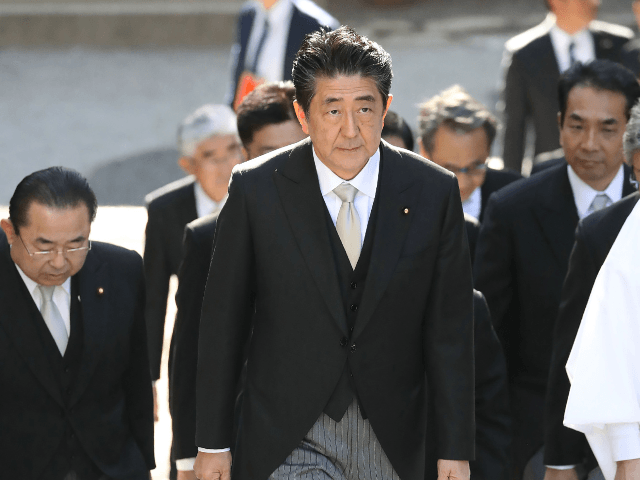Video footage of former Japanese Prime Minister Abe Shinzo’s assassination on Friday appears to show that the leader had very little security protecting him at the time of his murder, which took place as he gave a campaign speech outdoors.
The detail highlights how politicians in Japan seem to have less security during official appearances than their counterparts in other parts of the world.
Abe, 67, was shot and killed on July 8 in the western Japanese city of Nara while delivering a campaign speech for the Liberal Democratic Party (LDP), two days before a national election.
“Japan’s longest-serving leader was shot by a 41-year-old man who approached him from behind at around 11:30 a.m. as he was speaking in front of Kintetsu Railway’s Yamato-Saidaiji Station, police said,” according to Japan’s Kyodo News.
Professional news footage and eyewitness video of Abe’s last moments on July 8 appeared to show the leader with a limited security detail around him as he spoke. However, the security was lax enough that spectators were able to approach Abe both before and during his address.
後ろに安倍さん銃撃した犯人写ってる#安倍元総理 #山上徹也 pic.twitter.com/md26BvRH9Q
— sb (@sb_065) July 8, 2022
🇵— "Shooting suspect used 手製の銃 a hand made gun, per police report.
Shinzo Abe speaking at that location was only decided last night. So unclear how attacker had time to plan, reports NHK. Footage is of the hospital." pic.twitter.com/XCxnF8kvjQ— 🇺🇸mai🌟ke (@maike809588) July 8, 2022
“[T]here was a crowd of people listening to his speech near the railway station when the attack occurred,” Kyodo News observed on July 8.
“A Kyodo News reporter at the scene saw the attacker [a Japanese man named Tetsuya Yamagami] silently approach Abe, who had been speaking for several minutes, before shooting him,” the news agency revealed.
“Louds screams were heard from the crowd and Abe fell to the ground seconds later. Yamagami was immediately apprehended by police officers,” Kyodo News relayed.
“It is a rare case of a shooting in Japan, a country that has strict gun regulations. No Japanese prime minister after World War II had been killed,” the Tokyo-based news agency noted on Friday.
Japanese Prime Minister Kishida Fumio responded to Abe’s assassination on July 8 by instructing Japan’s top law enforcement authorities to “tighten” security for Japanese “Cabinet ministers and other politicians,” the Japan Broadcasting Corporation (NHK) reported.
“Kishida discussed responses to the attack with National Public Safety Commission Chairperson Ninoyu Satoshi, Justice Minister Furukawa Yoshihisa, and others for about 20 minutes on Friday afternoon,” NHK revealed.
Abe’s lack of sufficient security during his tragic final appearance on July 8 coupled with Kishida’s call for increased security hours later seems to indicate that Japanese politicians have low levels of police protection during official events. This may stem from Japanese law enforcement officials perceiving few public safety threats in the country. Statistics indicate that Japan is one of the safest nations in the world, as it demonstrates exceptionally low rates of violent crime and homicide compared to other countries.
Japan’s Nippon news website reported on Japanese crime data in December 2020, observing the following:
Looking at crime trends worldwide, in 2017 there were 307 homicides in Japan. In contrast, there were more than 800 each in France, Germany, and Britain, while the United States had 17,284 homicides, a staggering 56 times as many as Japan. The homicide rate per 100,000 people was 5.3 in the United States, 1.3 in France, 1.2 in Britain, and 1.0 in Germany, while it was only 0.2 in Japan.
These statistics are based on the United Nations Survey of Crime Trends and Operations of Criminal Justice Systems conducted by the UN Office on Drugs and Crime. That survey summarizes statistics from 2013 to 2017 for five major countries, including Japan, and takes into account homicide, robbery, theft, and sexual violence cases, all of which are important in assessing crime trends.
Violent crimes in Japan increased in 2019 to include “950 murders […] up 35 cases from the previous year,” Nippon reported in January 2021. The news website noted the detail while reporting that crime, in general, had decreased across Japan from 2019 to 2020 to its “lowest [level] on record since the end of World War II.” Japan has an estimated population of 125.6 million for reference.
Japan, which has extremely strict gun laws, recorded just ten firearm-related incidents in 2021, only one of which was fatal, according to data from Japan’s National Police Agency.
“Politicians in Japan often travel with fairly light security details compared to their peers in the United States and other countries that have higher rates of violent crime,” Reuters observed on July 8.
“Nippon Television quoted Nara police as saying Abe was protected at Friday’s rally by one armed specialised police officer who travelled from Tokyo, and some other local officers,” the news agency relayed.
Reuters said it contacted the Nara police department to ask “how many police officers were handling Abe’s security,” but that the department declined to answer.
“When he was shot Abe was standing at an intersection outside a train station, speaking to a crowd of hundreds as buses and vans passed behind his exposed back on the road where the assailant appeared,” Reuters noted.

COMMENTS
Please let us know if you're having issues with commenting.